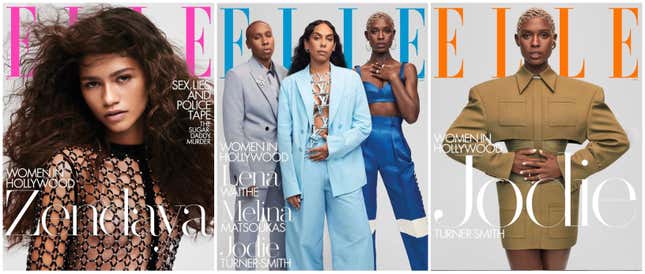
Ladies first: That’s the message of Elle’s 2019 Women in Hollywood issue, which features Zendaya and Queen & Slim’s Lena Waithe, Melina Matsoukas and Jodie Turner-Smith on three of its nine covers. And as Elle notes, it’s also a celebration of firsts: Lena Waithe’s first time writing a feature film, Melina Matsoukas’ first time directing one, Jodie Turner Smith’s first leading role, and Zendaya’s wildly unexpected first step out of her Disney comfort zone with HBO’s Euphoria.
“You put your shit out there, and it’s a really terrifying thing to do. It’s out for the world to see—it’s so fucking weird,” Zendaya says of playing the drug-addled and deeply sensitive lead character “Rue,” whose survival was in question by the show’s first season finale. “Rue is just a combination of my shit and [show creator Sam Levinson’s] shit, and together we created her,” the star continues. “I don’t feel too dissimilar from Rue. It didn’t feel fake to me; it felt like she was me in another version of my life.”
And while this version of her life is wildly successful and glamorous, Zendaya admits to the all-too-relatable neurosis that accompanies perfectionism, telling Elle: “Even though Euphoria coming out was amazing and exciting, it was also extremely stressful. It gave me a lot of anxiety every week. That’s something I deal with; I have anxiety,” she admits. “I never want to mess up. I’m trying to be the best version of myself without overapplying pressure. Then I start spiraling.”
But ironically, the challenge proved a turning point for the young actress/producer, who says: “I think Euphoria taught me a lot about myself. It made me more confident in my own abilities, because I doubted myself a lot.”
“People actually saying I did a good job at my craft...it’s like, ‘Damn, I did work hard. I’m glad you see that,” she concedes. “I should finally own that; it’s liberating. I feel lucky.”
Waithe, Matsoukas, and Turner-Smith—otherwise known as the women of Queen & Slim—cast a different lens on anxiety and the losing game of perfectionism in their interview, which was coincidentally conducted the day after Black Women’s Equal Pay Day. Specifically, the trio spoke on the pressure for creating content in an industry where black female representation is still a rarity.
“In our success comes other black people’s success, so there is a lot of pressure for us to do well—for the culture,” says Matsoukas. It’s hard to create art with that weight, and I feel it every day. It’s one of my greatest fears, failing. I just want to make my people proud.”
Turner-Smith concurs, using a well-known black adage to describe the experience of being black in Hollywood. “You have to work twice as hard to have half as much. Do you know what I mean?” she says. “[There’s] constantly a different standard we as black people hold ourselves to, and hold each other to, in a way that can be oppressive.”
Waithe eschews the mantle of perfectionism but calls writing her first feature an empowering accomplishment in an industry where she claims to have experienced “[her] own version of Jim Crow,” while creating and launching Showtime’s The Chi.
“I didn’t truly experience what it means to feel like a second-class citizen until I sold my first TV show,” she says. “During the first season, I didn’t have any real agency, so that’s when I started working on the script [for Queen & Slim]. It was almost my way of rebelling and reminding myself I do have a gift.”
But while Elle and others have hailed the highly anticipated film as “Bonnie and Clyde for the Black Lives Matter era,” Turner-Smith is equally interested in how it explores black intimacy onscreen.
“Sex can be portrayed as something that’s very animal. And black people, especially black men and women of our complexion, are often hypersexualized,” she tells Elle. “[There’s] a dichotomy of blackness where there can be such violence and terror, and yet in the middle of that, black people can find intimacy and beauty in the comfort of each other.”



